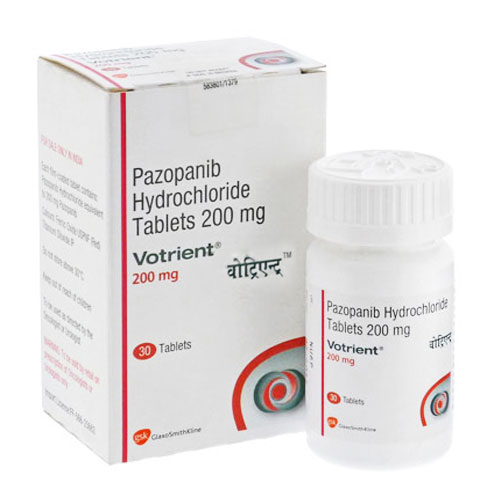Votrient 200 mg
Votrient 200 mg (Pazopanib) Tablet is a protein kinase inhibitor to handle kidney cancer and soft tissue sarcoma.
- Category : Anti Cancer
- Manufacturer : Generic
- Active Substance : Pazopanib
- Customer Rate
- Prescription : Required or Will Provide upon Online Doctor Consultation
INTRODUCTION
VOTRIENT 200MG TABLET contains Pazopanib which belongs to the group of medicines called Protein kinase inhibitors. It is used in the treatment of kidney cancer (that has advanced or spread to other organs) and soft tissue sarcoma.
Soft tissue sarcoma is a type of cancer that affects the supportive tissues of the body. It can occur in the muscles, blood vessels, fat tissues or other tissues that support, surround and protect the organs.
Your doctor may ask you to undergo certain diagnostic tests to check the functioning of your liver, kidney and heart and may monitor your blood pressure prior to and while you take VOTRIENT 200MG TABLET.
Before taking [GBNKEWYORD], consult with your doctor if you have any heart, kidney or liver diseases, had lung problems, thyroid problems, bleeding or blood clotting issues, stomach or bowel problems (perforation or fistula), aneurysm (enlargement and weakening of a blood vessel wall) or have high blood pressure.
VOTRIENT 200MG TABLET is not recommended in pregnant and breastfeeding women. VOTRIENT 200MG TABLET is not recommended in children and adolescents below 18 years of age. Consult with your doctor before taking VOTRIENT 200MG TABLET.
The most common side effects of VOTRIENT 200MG TABLET are indigestion, bloating, flatulence, nosebleed, dry mouth, mouth ulcers or dizziness. Consult with your doctor if the symptoms do not improve or get worse.
USES OF VOTRIENT 200MG TABLET
Treats:
- Kidney cancer
- Sarcoma (a cancer that begins in bones or in any soft tissues of the body)
HOW VOTRIENT 200MG TABLET WORKS
VOTRIENT 200MG TABLET works by stopping the activity of various growth factor receptors associated with blood vessel formation and tumour cell proliferation. It inhibits the activity of few other factors that are responsible for the multiplication of cancer cells and hence prevents the growth and spread of cancer cells.
DIRECTIONS FOR USE
Take VOTRIENT 200MG TABLET as advised by your doctor. Swallow VOTRIENT 200MG TABLET along with a glass of water. Do not crush or chew the medicine. Your doctor will decide the proper dose and duration of VOTRIENT 200MG TABLET for you depending upon the age, body weight and disease condition.
SIDE EFFECTS OF VOTRIENT 200MG TABLET
COMMON
- High blood pressure
- Diarrhoea
- Nausea or vomiting
- Stomach pain
- Loss of appetite
- Weight loss
- Taste disturbance or loss of taste
- Sore mouth
- Headache
- Tumour pain
- Inadequate energy, weakness or tiredness
- Hair colour changes, unusual loss of hair or hair thinning
- Skin pigment loss
- Skin rash, peeling of the skin, skin burning, prickling, itching or tingling sensation
- Redness and swelling in the hands or soles of the feet
- Signs of decrease in albumin in the blood (weakness and exhaustion)
- Signs of low blood platelets (prolonged bleeding from guts, blood in urine or stools)
- Decrease in the number of white blood cells (muscle weakness, fatigue)
- Indigestion, bloating, flatulence
- Nose bleed
- Dry mouth or mouth ulcers
- Abnormal drowsiness
- Sleeping difficulties
- Signs of blood clot such as chest pain, shortness of breath, leg pain, If the clot is broken, it might move to your lungs
- Decreased effectiveness of heart at pumping the blood around the body (cardiac dysfunction)
- Slow heart beat
- Bleeding of mouth, rectum or lung
- Dizziness
- Blurred vision
- Hot flushes
- Fluid accumulation in face, hands, ankles, feet or eyelids that causes swelling
- Tingling, weak or numb hands, arms, legs and feet
- Nail disorders
- Sensation of coldness, with shivering
- Excessive sweating
- Dehydration
- Chest pain, joint, tendon pain, muscle pain and spasms
- Hoarseness
- Cough, coughing up blood
- Hiccups
- Lung collapse with air trapped between the chest and lung, which can cause shortness of breath (pneumothorax)
- Underactive thyroid gland
UNCOMMON
- Stroke (due to blood clot)
- Short term fall in the supply of blood to the brain (transient ischaemic attack)
- Obstruction of blood supply to part of the heart or heart attack (myocardial infarction)
- Partial obstruction of supply of blood to part of the heart (myocardial ischaemia)
- Blood clots associated with decrease in red blood cells and cells involved in clotting (thrombotic microangiopathy) which causes harm to brain and kidneys
- Signs of increased red blood cells (such as shortness of breath, fatigue, joint pain)
- Sharp chest pain or fast breathing (pulmonary embolism)
- Severe bleeding in digestive system (such as stomach, oesophagus or intestine), or in the kidneys, vagina and brain, hole (perforation) in stomach or intestine
- Heart rhythm disturbance (QT prolongation)
- Abnormal passages forming between parts of the intestine (fistula)
- Heavy or irregular menstrual periods
- Sharp and sudden increase in blood pressure (hypertensive crisis)
- Signs of pancreas inflammation (pancreatitis) such as abdominal pain
- Signs of liver inflammation (such as nausea, fatigue)
- Skin or whites of the eyes become yellow in colour (jaundice)
- Inflammation of abdominal cavity lining (peritonitis)
- Runny nose
- Itchy or inflamed rashes (flat or raised spots or blisters)
- Frequent bowel movements
- Increased skin sensitivity especially to sunlight
- Lowered feeling or sensitivity, especially in the skin
- Skin wound that do not heal (skin ulcer)
RARE
- Inflammation of the lung (pneumonitis)
- Enlarged and weakened blood vessel wall or blood vessel wall tear (aneurysms and artery dissections)
Stop taking VOTRIENT 200MG TABLET and consult with your doctor if you experience any of the following symptoms:
- Signs of swelling of the brain (loss of speech, change of vision, seizure (fits), confusion, high blood pressure)
- Signs of sudden and severe rise in blood pressure (severe chest pain, severe headache, blurred vision, confusion, nausea, vomiting, severe anxiety, shortness of breath, fainting)
- Signs of heart failure or heart attack (irregular or fast heartbeat, rapid fluttering of your heart, fainting, chest pain or pressure, painful arms, back, neck or jaw, leg swelling)
- Signs of stroke (one side of your body becomes weak and numb, difficulty talking, headache, dizziness)
- Signs of e severe bleeding in the digestive system or the lungs, kidneys, mouth, vagina and brain (black stools or stools with blood, urine with blood, painful stomach, coughing or vomiting up blood)
- Signs of a tear (perforation) stomach or intestinal wall or the development of an abnormal connection between two parts of your digestive tract (a fistula) (severe stomach pain, fever, hole formation (perforation) in the stomach, intestine or bowel from which pus is released which is bloody and has foul smell)
- Signs of liver problems (yellowing of your skin or the whites of your eyes (jaundice), dark urine, tiredness, loss of appetite, pain on the right side of your stomach area (abdomen), bruising easily)
- Signs of formation of a blood clot (sharp chest pain, rapid breathing, leg pain, swelling of arms and hands or legs and feet, bruising easily, high blood pressure, drowsiness, decrease in urine output)
- Signs of tumor lysis syndrome (fast breakdown of tumor cells) such as irregular heartbeat, seizures (fits), confusion, muscle cramps or spasms or decrease in urine output
- Signs of infection (cough, tiredness and body aches, pain while urination, fever, red, warm, swollen and painful cuts, scrapes or wounds)
- Signs of lung inflammation (shortness of breath or cough that will not go away)
- Decreased thyroid function (weight gain)
- Change in vision (blurry or impaired vision)
HOW TO MANAGE SIDE EFFECTS
Diarrhoea:
Drink lots of fluids, such as water or fruit juice to keep yourself hydrated. Do not consume any medicine on your own without consulting your doctor. Ask for your doctor’s advice if diarrhoea doesn’t improve.
Nausea:
Take VOTRIENT 200MG TABLET at least two hours before the meal of one hour after a meal. Stick to simple meals while taking VOTRIENT 200MG TABLET. Avoid eating rich or spicy food. Do not take any medication on your own. Ask for your doctor’s advice if nausea doesn’t improve.
Headache:
Try to take rest and don’t involve yourself in exertive activities. Rest in a quiet and dark room. Apply a pain-relieving balm on your forehead. Ask for your doctor’s advice if headache doesn’t improve.
Vomiting:
Drink clear or ice-cold drinks. Eat light, bland foods and avoid fried, oily or sweet foods. Avoid carbonated drinks. Ask for your doctor’s advice if vomiting doesn’t improve.
Dizziness:
Lie or sit down immediately when you feel dizzy. If you’re feeling severe episode of spinning(vertigo), lie in a dark and quite place with eyes closed. Try to avoid vehicle driving. Discuss with your doctor if the symptom worsens.
Stomach pain:
Try to rest and relax. Try to have smaller and frequent meals. Keep a heat pad on your stomach. Take your physicians advice.
Flatulence:
Eat smaller and frequent meals. Eat and drink slow and exercise regularly. If it does not improve, contact your doctor.
Loss of appetite:
Eat when you are hungry. Eat a nutritious snack rich in calories and protein, such as dried fruit and nuts. If the symptom does not show improvement, consult your doctor.
Votrient 200 mg (Pazopanib) Tablet is a protein kinase inhibitor to handle kidney cancer and soft tissue sarcoma.
Reviews
There are no reviews yet.








Reviews
There are no reviews yet.